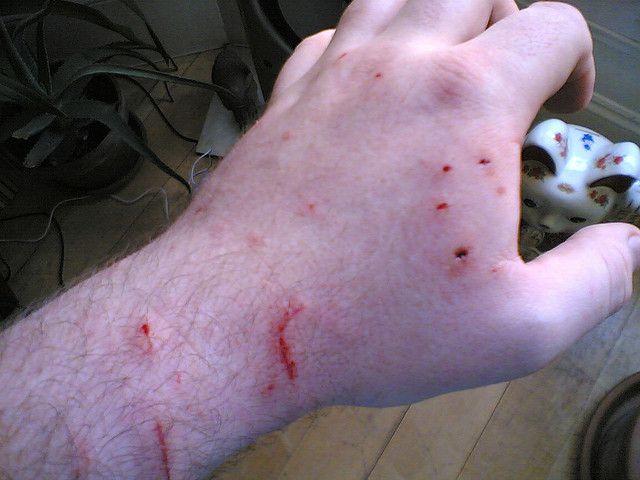Over the years, many pet owners have wondered about the potential health risks associated with cat bites. If you’ve ever been bitten by a cat, you may have concerns about whether that incident could lead to illness. It’s crucial to understand that cat bites can introduce bacteria and viruses into your body, potentially resulting in infections and other health complications. In this blog post, you’ll find valuable information on the risks associated with cat bites, the signs of infection, and the steps you should take to ensure your health and safety.
Key Takeaways:
- Infection Risk: Cat bites can introduce bacteria into the body, potentially leading to infections like *cat scratch fever* or other serious conditions.
- Immediate Treatment: It is crucial to clean the wound effectively and seek medical attention promptly to minimize the risk of complications.
- Vaccination Importance: Ensuring your cat is up-to-date on vaccinations, including rabies, can reduce the overall risk of illness associated with bites.
Understanding Cat Bites
Before discussing whether a cat bite can make you sick, it’s imperative to understand what a cat bite entails and the mechanics behind it.
Anatomy of a Cat Bite
With sharp, pointed canine teeth, a cat’s bite can penetrate deeply, injecting saliva into the wound, which often harbors bacteria. This interaction between skin and saliva is where the potential for infection begins.
Common Types of Cat Bites
On a general level, cat bites can vary widely in severity and cause. Some common types include:
| Type of Bite | Description |
| Defensive Bites | Occur when a cat feels threatened. |
| Play Bites | Typically light and indicative of playful behavior. |
| Hunting Bites | Result from a cat’s instinctual predatory behavior. |
| Redirected Bites | Happen when a cat is agitated and strikes out at a nearby person. |
| Infected Bites | Result from a bite that introduces bacteria into the skin. |
This range underscores that you should be cautious, as any type of bite can pose a risk if not treated properly. You should always consult a veterinarian or medical professional if bitten.
- Defensive bites can signify fear or aggression.
- Play bites might not break the skin but can lead to injuries.
- Hunting bites are common during natural play or exercise.
- Redirected bites often occur from stressed or frightened cats.
- Infected bites require prompt medical attention.
How Cat Bites Occur
Any instance where a cat bites can often be attributed to its instinctive behaviors or interactions with humans or other animals. Understanding these behaviors can help you minimize risks.
Common situations include rough play, feeling threatened, or when a cat is trying to assert dominance. Recognizing when a cat is agitated or scared can help you avoid being bitten. It’s all about identifying the triggers that provoke a cat to bite.
- Understand when a cat is feeling defensive.
- Observe your cat’s body language closely.
- Engage in interactive play to prevent predatory behavior.
- Provide a safe environment to reduce stress.
- Always supervise interactions between cats and children.
Potential Health Risks
The risks associated with cat bites can range from mild to severe, and it’s vital to understand what these potential health issues are to guard your well-being.
Infections from Cat Bites
An infection from a cat bite can occur immediately or may develop over time. Symptoms like redness, swelling, and pus around the bite area could indicate an infection, which may require medical intervention. It’s important to clean the wound properly and seek medical advice, particularly if symptoms worsen.
Allergic Reactions
One potential health risk you might face is an allergic reaction to a cat bite. Although rare, allergic reactions can cause swelling, itchiness, or even hives, which may necessitate medical treatment. Being aware of your body’s signals can help you respond promptly.
Understanding the nature of allergic reactions is key. Even if you have interacted with cats before without issue, a cat bite may trigger an unexpected response due to proteins in cat saliva. If you experience symptoms like difficulty breathing, swelling of the face, or severe rashes, seek medical attention immediately.
Cat Scratch Disease
From a bite or scratch, you might contract Cat Scratch Disease, which is caused by the bacteria Bartonella henselae. This disease can lead to swollen lymph nodes, fever, and fatigue, so recognizing the signs early is crucial.
Bites from infected cats introduce these bacteria into your system, which can lead to further complications if left untreated. While many cases resolve on their own, some may require antibiotics, especially in individuals with weakened immune systems. If you notice any symptoms after a cat scratch or bite, it’s vital to consult your healthcare provider.
Symptoms of Infection

Once again, it’s crucial to recognize the signs of infection that can arise from a cat bite. Cat bites can introduce bacteria into your body, potentially leading to various symptoms that range from mild to severe. Understanding these symptoms can help you seek prompt medical care and avoid serious complications.
Early Signs to Watch For
The initial symptoms of an infection may include redness, swelling, and warmth around the bite site. You might also experience pain, tenderness, or a feeling of tightness in the affected area. Additionally, if you notice any discharge or pus coming from the wound, it’s vital to consult a healthcare provider.
Severe Symptoms
One of the alarming signs of an infection is the development of fever, chills, or flu-like symptoms. If you experience nausea, vomiting, or increased heart rate, these can indicate that the infection is worsening and requires immediate attention.
Plus, severe symptoms may progress into more serious issues such as abscess formation or systemic infections that affect other parts of your body. You should watch for swelling that spreads beyond the bite area or any sign of confusion or lethargy, as these can signal more critical health concerns. Prompt medical attention is vital to prevent further complications.
Long-term Complications
For those who experience untreated infections from cat bites, long-term complications can manifest. This may include chronic pain, scarring, or even the development of more serious conditions like osteomyelitis, an infection of the bone.
A delayed response to a cat bite infection can lead to significant health risks that impact your quality of life. It’s vital to stay vigilant with any bite wounds and take appropriate action if symptoms persist, ensuring that you do not face long-lasting effects on your health.
Treatment and Prevention
All cat bites should be taken seriously, as they can potentially lead to infections. According to Cat Bites May Lead to Infections, it’s crucial to follow proper treatment guidelines to minimize health risks.
First Aid for Cat Bites
Prevention starts with immediate first aid. Wash the bite area gently with soap and water for at least five minutes to remove harmful bacteria. Apply an antiseptic and cover it with a sterile bandage. If the wound is deep or continuously bleeding, apply pressure and seek medical attention as soon as possible.
When to Seek Medical Attention
With any cat bite, knowing when to seek medical help can protect your health. You should seek medical attention if there are signs of infection, such as redness, swelling, warmth, or pus around the wound, or if you experience fever or chills.
A common indicator that a cat bite requires professional care is the severity of the wound. Deep puncture wounds, those that won’t stop bleeding, or bites located near vital areas like the face or hands may need medical evaluation for potential suturing or other treatments.
Preventive Measures
Prevention of cat bites can significantly reduce your risk of infection. Always approach unfamiliar cats cautiously and avoid provoking them, as even friendly-looking cats can bite if they feel threatened. It’s advisable to handle your own cat gently and teach others, especially children, the best ways to interact with pets.
Understanding the importance of preventive measures can help cultivate a safe environment for both you and your cat. Familiarizing yourself with feline body language and respecting a cat’s personal space can reduce the likelihood of aggressive behavior, minimizing the chances of bites and subsequent infections.
Conclusion

From above, you can see that a cat bite can indeed make you sick due to the various bacteria and viruses that may be introduced into your system. It’s vital to monitor your wounds for signs of infection and to seek medical attention if necessary. Remember that prevention is crucial, so take care when interacting with cats. You can learn more about the risks associated with cat bites by visiting Cat Bites and Scratches.
Q: Can a cat bite lead to infection?
A: Yes, a cat bite can lead to infection. Cat mouths contain a variety of bacteria, and when a cat bites, those bacteria can enter the wound. Common infections resulting from cat bites include cellulitis, which is an infection of the skin, and more serious conditions like abscesses that require medical attention. It’s always important to clean the wound thoroughly and seek medical advice if the bite is deep, shows signs of infection (redness, swelling, pus), or if you have not had a recent tetanus shot.
Q: What are the symptoms of a cat bite infection?
A: Symptoms of a cat bite infection may include redness, swelling, warmth, and tenderness around the bite area. You might also experience fever, chills, increased pain, or a foul-smelling discharge. If you notice any of these symptoms after being bitten by a cat, it is crucial to seek medical help promptly, as untreated infections can lead to more severe complications.
Q: Should I get a rabies shot if bitten by a cat?
A: Whether you need a rabies shot after a cat bite depends on several factors. If the cat is a known domestic pet with a valid rabies vaccination, a shot may not be necessary. However, if the cat is stray or its vaccination status is unknown, it is crucial to consult a healthcare provider. Rabies is a fatal disease, and treatment after exposure is critical. Always take potential rabies exposure seriously and discuss your situation with a medical professional to determine if post-exposure prophylaxis is needed.










